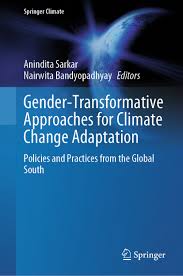
Gender-transformative adaptation for food security, rural livelihoods, and agriculture: the case study of Mal Pahariya women in Eastern coalfield regions of India
Banarjee, AparajitaExternal Publications (2025)
in: Anindita Sarkar / Nairwita Bandyopadhyay (eds), Gender-Transformative Approaches for Climate Change Adaptation: policies and practices from the Global South, Cham: Springer, 227-245
DOI: https://doi.org/10.1007/978-3-031-90236-9_12
Information
Climate extremes like prolonged droughts or excessive flooding disrupt the intertwined lives of rural women with agriculture in the Global South, especially those dependent on traditional practices like shifting cultivation or rain-fed irrigation. Agriculture is not just food production or a livelihood for these women but an extension of the care work that helps them feed their families. On the other hand, traditional hetero-patriarchal social norms continue to disempower them to make choices related to agriculture and food production as they often lack the decision-making and ownership rights on the land they toil. Women belonging to marginalized tribal communities facing compound intersectional challenges due to gender, caste, ethnicity, illiteracy, poverty, and language find it even harder to define their life goals and act upon them. This chapter shows how specific gender-transformative adaptation measures, such as promoting women’s land rights, providing access to climate-resilient seeds, and offering training in climate-smart agricultural practices, can bring in, albeit small, transformative changes. Based on ethnographic research, semi-structured interviews, and focus group discussions with Mal Pahariya women and NGO workers in Jharkhand, India, this chapter shows how these measures, if designed effectively, can tackle the root causes embedded in the existing social, political, economic, and cultural context that aids gender inequality and injustice to persist. The study also shows that food and nutrition security, leadership, economic decision-making, and capacity building by learning new skills can emerge as co-benefits that can help them address other daily challenges.
